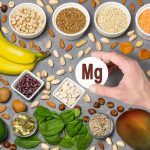Blunt TRUTH: Do NOT get deficient in THIS essential nutrient
 (NaturalHealth365) Magnesium is an important mineral that offers some impressive health benefits and is involved in hundreds of functions within the body. Without it, humans are at risk of a range of physical and even mental problems.
(NaturalHealth365) Magnesium is an important mineral that offers some impressive health benefits and is involved in hundreds of functions within the body. Without it, humans are at risk of a range of physical and even mental problems.
The challenging thing is, several magnesium supplements exist. Which is the best supplement for your health needs? Let’s look to the research to help guide us in the right direction.
Citrate, glycinate, and oxide – oh my! Here’s how to choose the best magnesium supplements!
According to the National Institutes of Health Office of Dietary Supplements, magnesium citrate, aspartate, lactate, and chloride appear to be more bioavailable than magnesium oxide and magnesium sulfate. This means they are more easily absorbed by the body and consequently can actually be put to use for good. (In addition to poor absorption rates, there may be another reason to avoid magnesium oxide as a dietary supplement. According to the NIH, this form – along with magnesium chloride and magnesium carbonate – is most likely associated with diarrhea and abdominal cramping.)
Magnesium citrate, in particular, appears to shine in terms of bioavailability. One older randomized and double-blinded study published in the aptly named scientific journal Magnesium Research found that this form was “superior” to magnesium oxide and another preparation known as amino-acid chelate.
Other crowd favorites among natural health and wellness circles include:
- Magnesium L-threonate
- Magnesium orotate
- Magnesium glycinate
- Magnesium malate
By the way, magnesium sulfate (aka Epsom salts) may enhance the soothing effects of your bath. Still, it’s unclear whether magnesium can effectively get absorbed through your skin, so you may not want to rely on this product to increase your intake.
Because the best supplement for you might vary depending on your particular health needs and goals – and because it is possible to develop magnesium toxicity from supplementing with too much of this mineral – it’s a good idea to chat with your medical provider before.
Avoid becoming deficient in magnesium – here’s how to get enough of this essential nutrient
Magnesium deficiency or even subclinical deficiency (insufficient but not so low to reach the formal definition of deficiency) is no joke. Not having enough of this mineral in your body may contribute to issues like headaches, muscle cramps, and impaired bone and nervous system health. A recent study published in the Journal of the American Osteopathic Association suggests that 50 percent of Americans don’t get enough magnesium which could even render another important nutrient, vitamin D, ineffective in the body.
So, there’s no question that you need to ensure you’re getting plenty of this nutrient into your body. As a reminder, the recommended daily intake of magnesium for adults is about 320 milligrams and 420 milligrams for women and men, respectively (and about 310 mg to 360 mg for pregnant or lactating women). And whether you choose to add a high-quality magnesium supplement to your routine, the NIH Office of Dietary Supplements also recommends eating magnesium-rich foods.
The following foods contain at least 42 mg of magnesium per serving, or about 10 percent of the recommended daily value:
- Pumpkin seeds
- Chia seeds
- Almonds
- Spinach
- Black beans
- Potatoes
- Plain yogurt
Sources for this article include:
NIH.gov
Healthline.com
ScienceDaily.com
NIH.gov
NIH.gov
NIH.gov



